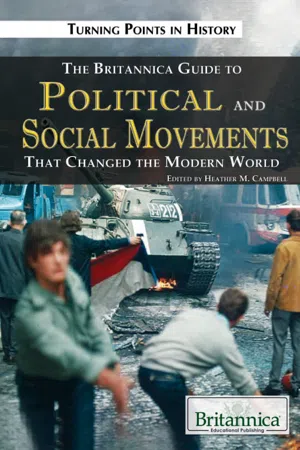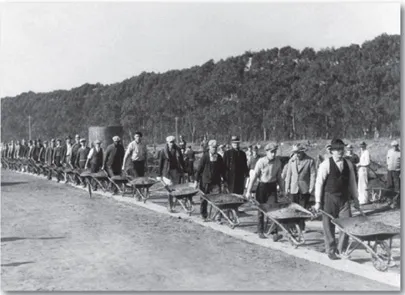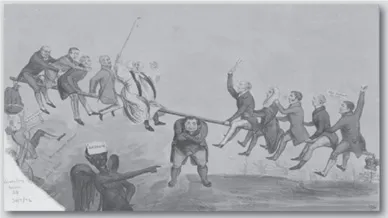
eBook - ePub
The Britannica Guide to Political Science and Social Movements That Changed the Modern World
Britannica Educational Publishing, Heather Campbell
This is a test
Share book
- English
- ePUB (mobile friendly)
- Available on iOS & Android
eBook - ePub
The Britannica Guide to Political Science and Social Movements That Changed the Modern World
Britannica Educational Publishing, Heather Campbell
Book details
Book preview
Table of contents
Citations
About This Book
Few forces are more powerful than a group of people united by a common cause. Collective objectives, known as movements, have been known to radically alter the course of human history. This book traces an array of important political and social movements from their inception to their apex, with plentiful side discussions of notable proponents.
Frequently asked questions
How do I cancel my subscription?
Can/how do I download books?
At the moment all of our mobile-responsive ePub books are available to download via the app. Most of our PDFs are also available to download and we're working on making the final remaining ones downloadable now. Learn more here.
What is the difference between the pricing plans?
Both plans give you full access to the library and all of Perlego’s features. The only differences are the price and subscription period: With the annual plan you’ll save around 30% compared to 12 months on the monthly plan.
What is Perlego?
We are an online textbook subscription service, where you can get access to an entire online library for less than the price of a single book per month. With over 1 million books across 1000+ topics, we’ve got you covered! Learn more here.
Do you support text-to-speech?
Look out for the read-aloud symbol on your next book to see if you can listen to it. The read-aloud tool reads text aloud for you, highlighting the text as it is being read. You can pause it, speed it up and slow it down. Learn more here.
Is The Britannica Guide to Political Science and Social Movements That Changed the Modern World an online PDF/ePUB?
Yes, you can access The Britannica Guide to Political Science and Social Movements That Changed the Modern World by Britannica Educational Publishing, Heather Campbell in PDF and/or ePUB format, as well as other popular books in History & World History. We have over one million books available in our catalogue for you to explore.
Information
Chapter 1:
Liberalism
Liberalism is one of the most enduring political doctrines in human history, fostering the rise of representative democracy throughout the world. It takes protecting and enhancing the freedom of the individual to be the central problem of politics. Liberals typically believe that government is necessary to protect individuals from being harmed by others, but they also recognize that government itself can pose a threat to liberty. As the revolutionary American pamphleteer Thomas Paine expressed it in “Common Sense” (1776), government is at best “a necessary evil.” Laws, judges, and police are needed to secure the individual’s life and liberty, but their coercive power may also be turned against him. The problem, then, is to devise a system that gives government the power necessary to protect individual liberty but also prevents those who govern from abusing that power.
The problem is compounded when one asks whether this is all that government can or should do on behalf of individual freedom. Some liberals—the so-called neoclassical liberals, or libertarians—answer that it is. Since the late 19th century, however, most liberals have insisted that the powers of government can promote as well as protect the freedom of the individual. According to modern liberalism, the chief task of government is to remove obstacles that prevent individuals from living freely or from fully realizing their potential. Such obstacles include poverty, disease, discrimination, and ignorance. The disagreement among liberals over whether government should promote individual freedom rather than merely protect it is reflected to some extent in the different prevailing conceptions of liberalism in the United States and Europe since the late 20th century. In the United States liberalism is associated with the welfare-state policies of the New Deal program of the Democratic administration of Pres. Franklin D. Roosevelt, whereas in Europe it is more commonly associated with a commitment to limited government and laissez-faire economic policies.

CLASSICAL LIBERALISM
Although liberal ideas were not noticeable in European politics until the early 16th century, liberalism has a considerable “prehistory” reaching back to the Middle Ages and even earlier. In the Middle Ages the rights and responsibilities of the individual were determined by his place in a hierarchical social system that placed great stress upon acquiescence and conformity. Under the impact of the slow commercialization and urbanization of Europe in the later Middle Ages, the intellectual ferment of the Renaissance, and the spread of Protestantism in the 16th century, the old feudal stratification of society gradually began to dissolve, leading to a fear of instability so powerful that monarchical absolutism was viewed as the only remedy to civil dissension.
The ambitions of national rulers and the requirements of expanding industry and commerce led gradually to the adoption of economic policies based on mercantilism, a school of thought that advocated government intervention in a country’s economy to increase state wealth and power. However, as such intervention increasingly served established interests and inhibited enterprise, it was challenged by members of the newly emerging middle class. This challenge was a significant factor in the great revolutions that rocked England and France in the 17th and 18th centuries—most notably the English Civil Wars (1642–51), the Glorious Revolution (1688–89), the American Revolution (1775–83), and the French Revolution (1789). Classical liberalism as an articulated creed is a result of those great collisions.
In the English Civil Wars, the absolutist king Charles I was defeated by the forces of Parliament and eventually executed. The Glorious Revolution resulted in the abdication and exile of James II and the establishment of a complex form of balanced government in which power was divided between the king, his ministers, and Parliament. In time this system would become a model for liberal political movements in other countries. The political ideas that helped to inspire these revolts were given formal expression in the work of the English philosophers Thomas Hobbes and John Locke. In Leviathan (1651), Hobbes argued that the absolute power of the sovereign was ultimately justified by the consent of the governed, who agreed, in a hypothetical social contract, to obey the sovereign in all matters in exchange for a guarantee of peace and security.
Locke also held a social-contract theory of government, but he maintained that the parties to the contract could not reasonably place themselves under the absolute power of a ruler. Absolute rule, he argued, is at odds with the point and justification of political authority, which is that it is necessary to protect the person and property of individuals and to guarantee their natural rights to freedom of thought, speech, and worship. Significantly, Locke thought that revolution is justified when the sovereign fails to fulfill these obligations. Indeed, it appears that he began writing his major work of political theory, Two Treatises of Government (1690), precisely in order to justify the revolution of two years before.
By the time Locke had published his Treatises, politics in England had become a contest between two loosely related parties, the Whigs and the Tories. These parties were the ancestors of Britain’s modern Liberal Party and Conservative Party, respectively. Locke was a notable Whig, and it is conventional to view liberalism as derived from the attitudes of Whig aristocrats, who were often linked with commercial interests and who had an entrenched suspicion of the power of the monarchy. The Whigs dominated English politics from the death of Queen Anne in 1714 to the accession of King George III in 1760.
In addition to Hobbes and Locke, the 18th-century philosopher Jean-Jacques Rousseau also examined the idea of the social contract. Rousseau held that in the state of nature people are unwarlike but also undeveloped in reasoning and morality; in surrendering their individual freedom, they acquire political liberty and civil rights within a system of laws based on the “general will” of the governed. The various notions of the social contract influenced the shapers of the American Revolution and the French Revolution and the constitutions that followed them.
LIBERALISM AND DEMOCRACY
The early liberals worked to free individuals from two forms of social constraint—religious conformity and aristocratic privilege—that had been maintained and enforced through the powers of government. The aim of the early liberals was thus to limit the power of government over the individual while holding it accountable to the governed. As Locke and others argued, this required a system of government based on majority rule—that is, one in which government executes the expressed will of a majority of the electorate. The chief institutional device for attaining this goal was the periodic election of legislators by popular vote and of a chief executive by popular vote or the vote of a legislative assembly.
But in answering the crucial question of who is to be the electorate, classical liberalism fell victim to ambivalence, torn between the great emancipating tendencies generated by the revolutions with which it was associated and middle-class fears that a wide or universal franchise would undermine private property. Benjamin Franklin spoke for the Whig liberalism of the Founding Fathers of the United States when he stated: “As to those who have no landed property in a county, the allowing them to vote for legislators is an impropriety. They are transient inhabitants, and not so connected with the welfare of the state, which they may quit when they please, as to qualify them properly for such privilege.”
John Adams, in his Defense of the Constitutions of Government of the United States of America (1787), was more explicit. If the majority were to control all branches of government, he declared, “debts would be abolished first; taxes laid heavy on the rich, and not at all on others; and at last a downright equal division of everything be demanded and voted.” French statesmen such as François Guizot and Adophe Thiers expressed similar sentiments well into the 19th century.
Most 18th- and 19th-century liberal politicians thus feared popular sovereignty; for a long time, consequently, they limited suffrage to property owners. In Britain even the important Reform Bill of 1867 did not completely abolish property qualifications for the right to vote. In France, despite the ideal of universal male suffrage proclaimed in 1789 and reaffirmed in the Revolutions of 1830, there were no more than 200,000 qualified voters in a population of about 30,000,000 during the reign of Louis-Philippe, the “citizen king” who had been installed by the ascendant bourgeoisie in 1830. In the United States, the brave language of the Declaration of Independence notwithstanding, it was not until 1860 that universal male suffrage prevailed—for whites. In most of Europe, universal male suffrage remained a remote ideal until late in the 19th century. Racial and sexual prejudice also served to limit the franchise—and, in the case of slavery in the United States, to deprive large numbers of people of virtually any hope of freedom. Efforts to extend the vote to women met with little success until the early years of the 20th century. Indeed, Switzerland, which is sometimes called the world’s oldest continuous democracy, did not grant full voting rights to women until 1971.
Despite the misgivings of men of the propertied classes, a slow but steady expansion of the franchise prevailed throughout Europe in the 19th century—an expansion driven in large part by the liberal insistence that “all men are created equal.” But liberals also had to reconcile the principle of majority rule with the requirement that the power of the majority be l...
